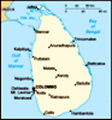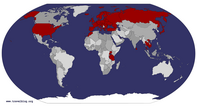Advertisement
Published: September 6th 2017
The day started with dung. I thought it was a joke but for real, at 9am our guide, Kelum took us plus two other tourists on a walk to the 'Dung Factory'. Maybe it's me, or would be better marketed as the 'Elephant Paper Centre' or something green sounding, because it is all about the recycling after all. Elephants eat around 130kg of food each day and crap around 16 times. The dung is 90% plant fibre, so perfect for making paper.
The short walk followed the road we drove in on last night, lined with ramshackle shops and businesses with no pavements but lots of mopeds, tuk-tuks and cars. The heat was enough to make you rain sweat just standing in it. The Dung Factory was a few small buildings and we were promptly shown a big pile of poo (by their own guide), which didn't really smell and just looked like muddy chewed up plants, which is what it is really. We were shown how it is boiled with some other stuff to clean it up and get rid of any smell. The guide insisted upon us holding and sniffing clean dung. The small tour took us around
the paper making process, including the female workers who moulded relief shapes and did some fancy painting. Naturally it ended up in the gift shop, where the guide asked for a tip even though the large sign on the wall said that the 'explanation is free'.
Two more guests joined us for the cookery lesson back at the Elephant Project. We got chopping various vegetables and all had a go on a special stool with attached round spiky blade for scraping out coconuts. Each of us were invited to sniff herbs and spices, guessing what they were, I hadn't a hope in hell (I don't cook at home). My favourite dish was the aubergine curry and I sent Glyn to sit with Kelum to make a note of the ingredients so he can make it at home. Lunch was the food we cooked plus some extras and there was far more than enough.
Finally it was time to meet the elephant, there are two, but one was busy at a festival. They are both rescues, one being from the logging industry and the one we were with today, Seetha, who used to work giving tourists rides. For some
reason, the elephants can't be bought and so are rented from their owners, who insist they are chained at night. But at least they don't have to carry six tourists and metal seating any more. We were driven in the same rickety minibus from yesterday for around 40 minutes to Seetha who was tethered in a small field under some trees. The elephant keeper was late so there was a bit of hanging around, but not to worry, I saw a black cat!
Eventually the keeper put in an appearance, unchained Seetha and we took turns at feeding her cucumbers. She then lumbered slowly down a jungle lined narrow road, with the keeper shouting various commands. A few tuk-tuks and mopeds passed by but Seetha was unconcerned. She stopped for a while to decimate a small tree and other foliage as we all stood waiting for quite some time whilst she was stuffing her face and then the keeper's son turned up. The walk took us down to a river where women were washing clothes, young girls were swimming and an old lady looked like she was drowning herself but was in fact washing her hair. They all smiled
and were fine about letting me take photos if not a little embarrassed.
The keeper coaxed Seetha into the river where she lay on her side and we were shown how to splash water over her and scrape away any dirt with pieces of coconut shell. The tourists were only allowed to do her back but I also got to scrub her bum. This was no short process and people were eventually losing interest but we were instructed to keep at it, the elephant needs cleaning not just for hygiene but to keep off parasites. I stepped quite deep into the water and was a bit dubious about what was in there, a few small fish nibbled at my feet but I became a little anxious when someone mentioned water snakes. The keeper and his son scrubbed at Seetha's head, ears, trunk and tail. Then she got up, turned around and lay on her other side (just like a cat) so that we could clean her other side - it took forever. And then we weren't done because when she stood up, her legs needed sorting. To be honest she looked no different to when we started and this
is done every day! No way would I want my own elephant, it's a full time job.
It was time to say goodbye to Seetha and we walked back uphill to the minibus. Back at the accommodation, we quickly got changed out of our wet gear and Mrs and Mr Ananda (who run the foundation) organised a tuk-tuk to pick us up at 6pm. The rain began, but it was light and we raced through dark wet streets to Rambukkana station where it cost 5p each to catch a train to Polgahawela. The train was high above the platform and it took some climbing to get in it. It was also packed in third class, so a struggle to get in. It was standing room only but at least we got away from the doors which were wide open during the entire journey with people hanging on in the doorway.
Arriving at Polgahawela station, Glyn spotted a sign in various languages instructing the reader to be polite to women. Glyn took note. He wanted to buy snacks but the vendor insisted we eat in even though it was just drinks and a packet of crisps. I've not noticed
anyone eating in public here so maybe it's frowned upon? There was a bit of a wait for the train to Tambuttegama but it was warm and a good time to catch up on writing blogs. A trip to the station toilets wasn't the best: one smelly squat loo with a jug of water to wash things down, but at least there was a sink.
The train was 15 minutes late and we splashed out on 2nd class, paying around £1 each for the 2.5 hour journey to Tambuttegama. The interior was wooden covered with chipped old blue paint. In each carriage three rotating fans, like desk fans were stuck to the ceiling. The wide open windows looked very easy to fall out of. We could not find a seat together until a man kindly gave up his seat. Glyn spotted a sign at one end of the carriage that allocated those seats for clergy, makes a change from the elderly and pregnant!
We arrived at Tambuttegama an hour late despite only leaving 15 minutes late. It was around midnight, the platform was a sandy path and full of people waiting, but not for our train. Where were
they all going at this hour? Two guys greeted us from our accommodation but then the station guy told us all to wait, but we didn't know what for. Looking around I sussed that the only way off the 'platform' was by crossing the railway line. The train hung around for ages and as we were the only foreigners, were stared at a lot. Eventually our guys got fed up, grabbed our camera bags and jumped onto the train, pushing past all the passengers who feel the need to stand in the open doorways and so we followed them. Shoving aside more people with our rucksacks, we made it through to the other side and climbed down onto the railway tracks. The last rung of the train ladder was too high above the ground for my short legs and I struggled in an ungainly manner to the ground. The first guy turned out to be Bandara, our accommodation manager and cook and the other is the 'caretaker'.
Bandara had a torch and led us across the dark tracks to an awaiting safari jeep that the caretaker drove at speed to our accommodation. It was quite windy and I was
a bit cold. Bandara flashed his torch at random things and spoke about them but I didn't understand a word.
Bandara was very proud of Wilpattu Holiday Home. It's a few rooms and outdoor dining area in the middle of nowhere, we couldn't even see any roadside shacks that pass for shops around here. Now Glyn had pre-booked via Booking.com for two nights totalling at £28. But Bandara asked if we were in the $20 room (per night), upon looking at the tiny room, with two narrow beds, just enough room for a person to walk around and one lonely fan, we were not impressed. The bathroom was outside and this was not as described online. So he showed us another room with two double beds, ensuite bathroom (no hot water though) aircon, towels and electric sockets. This was better and was $25, then it became $30 per night. We weren't happy but he didn't seem to understand English pounds or that we had already agreed a price online. Or maybe he did and he was deliberately ripping us off. Either way we were stuck, we were far from any town, it was 1am and we were due to
get up at 5am. So we agreed to his price and went to bed a little deflated. This is when we discovered that our room has a doorbell, which Bandara rung because the caretaker needed paying right now for the lift from the station. Well, I guess it's all part of the self-touring cheaply experience!
Advertisement
Tot: 0.103s; Tpl: 0.033s; cc: 9; qc: 28; dbt: 0.0575s; 1; m:domysql w:travelblog (10.17.0.13); sld: 1;
; mem: 1.1mb
















D MJ Binkley
Dave and Merry Jo Binkley
Bath time
We did that in Nepal and we were as wet as the elephant